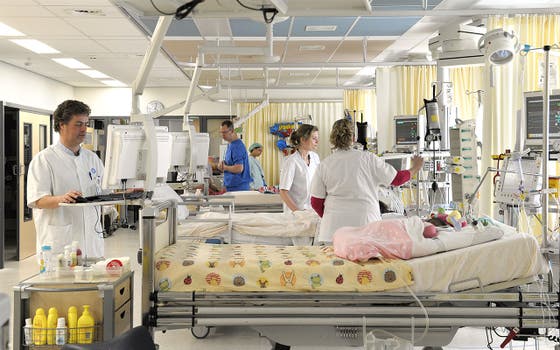Substantial grant awarded for smart alarm in ICU

UMC Utrecht is coordinating the Smart Alarm Management Study. This investigates ways in which beeping medical devices around the patient's bedside can be used differently. Using smarter algorithms, the devices can transform into a silent alarm chain that informs the caregiver in a proper and timely manner. Eight tons have been allocated for this study, which is being conducted as part of Smart And Silent ICU (SASICU). This is a €17 million public-private funded research project. Several other European teaching hospitals and Innovation Partners Dräger and Ascom are involved.
Lees artikel in het Nederlands >
Lead researchers Erik Koomen (paediatric intensivist at Wilhelmina Children's Hospital) and Teus Kappen (anaesthesiologist and CSIO) explain the aims of Smart And Silent ICU: "Sick children, sick adults and their families experience anxiety and stress when medical equipment keeps beeping. In many cases, the alarm is unnecessary too. This results, for example, in nurses in pediatric and adult ICU wards reassuring patients and families throughout the day. After all, worried relatives want to know what is going on with every alarm."
Today, most patients in the ICU are still in a ward, but that is going to change in the future. There will be children's IC rooms (PICU) in the new wing of the Wilhelmina Children's Hospital. In the new intensive care unit, each patient will have their own room. Setting up the alarm chain differently in the future will also create a situation where the devices next to the bed provide nurses with targeted information. They can act safely and appropriately based on sensible information, without burdening the patient and family with alarm signals from the medical equipment.
Improve patient care
The Smart Alarm Management Study takes a closer look at the smart use of medical devices in an ecosystem. The challenge is to translate alarms and data from the devices into appropriate information for the caregiver. In the current setting, an ICU nurse receives alarms every 2-3 minutes. These beeps disrupt the work process that the nurse is focused on, while 80-90% of these alarms do not directly request an action. Alarms and data from medical devices are meant to ensure patient safety and support the work process, but currently often miss the mark. In this study, we will develop and test a system with healthcare providers to reduce alarm pressure and improve patient care.
